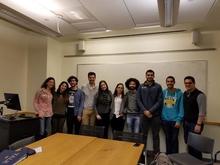Lilia Moritz Schwarcz Discusses Brazil’s “Sad Visionary”

On November 7, anthropologist and historian Lilia Moritz Schwarcz offered a talk entitled, “Lima Barreto: A sad visionary in Brazil at the beginning of the XX century” as part of the Council on Latin American and Iberian Studies Lunchtime Colloquia. Professor Schwarcz is a Professor of Anthropology at the University of Sao Paulo and a Visiting Professor of Anthropology at Princeton University. Her talk gave listeners a taste of the content of her recent publication Lima Barreto: Triste Visionário, published in 2017 by Companhia das Letras (Sao Paulo).
Afonso Henriques de Lima Barreto (1881-1922) was an Afro-Brazilian writer whose prescient critiques of Brazil’s structural racism and supposed “racial democracy” still have resonance today. His writings attempt to break apart the social Darwinism and racial determinism reigning in Brazil at the beginning of the 20th century. As Professor Schwarcz explained, the Portuguese word triste has two connotations, and Lima Barreto was both: he was sad, yes, but also persistent and stubborn.
Professor Schwarcz highlighted the writer’s many contradictions, positioning him in a liminal space that allowed him to become the social prophet and visionary that he was. He spoke from both the suburbs and the urban centers. He was committed to mental hospitals twice, once listed as “white” on his intake form, and once as “pardo”. He supported himself for years as a clerk in a government office while writing vitriolic critiques of the government. Even in death, he was a contradiction: he condemned Rio de Janeiro’s elite neighborhoods throughout his life, but was buried in its posh Botafogo neighborhood. He saw himself as a militant anarchist writer rather than an activist, using his critical eye to observe and comment on society.
After the lecture, Professor Schwarcz met with a group of graduate students from Professor Stuart Schwartz’ History of Brazil seminar, as well as with Brazilian students from many of Yale’s graduate and professional schools. They discussed her published works (including the newly released Brazil: A Biography), her career as interdisciplinary scholar and museum curator, and the recent Brazilian presidential elections.
Written by Blair Nelsen
